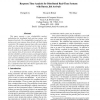39 search results - page 1 / 8 » Performance Debugging of Real-Time Systems Using Multicriter... |
123
click to vote
RTAS
2007
IEEE
15 years 8 months ago
2007
IEEE
Most of today’s real-time embedded systems consist of a heterogeneous mix of fully-programmable processors, fixed-function components or hardware accelerators, and partially-pr...
138
click to vote
ICPP
1998
IEEE
15 years 6 months ago
1998
IEEE
This paper presents a new schedulability analysis methodology for distributed hard real-time systems with bursty job arrivals. The schedulability is analyzed by comparing worst-ca...
137
click to vote
ECRTS
2009
IEEE
14 years 12 months ago
2009
IEEE
While hardware caches are generally effective at improving application performance, they greatly complicate performance prediction. Slight changes in memory layout or data access p...
117
Voted
HIPC
2003
Springer
15 years 7 months ago
2003
Springer
The use of feedback control techniques has been gaining importance in real-time scheduling as a means to provide predictable performance in the face of uncertain workload. In this ...
131
Voted
EMSOFT
2001
Springer
15 years 6 months ago
2001
Springer
Abstract. This paper presents our experience implementing the memory management extensions in the Real-Time Specification for Java. These extensions are designed to given real-tim...

